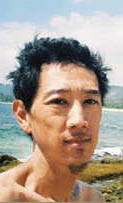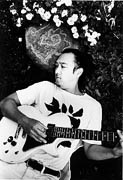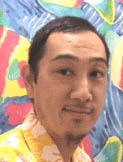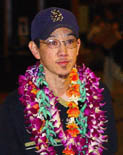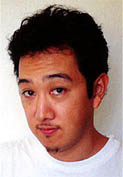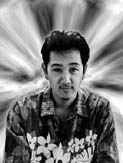Gone But Not Forgotten
January 15, 2002
The mission of this project has been to provide a voice of
hope and inspiration in the face of cancer. In keeping with
that mission, I write today about a few people who have inspired
me with their courage and dignity. Their example has helped
me in my life and, more recently, through some tough times.
In honor of Martin Luther King, Jr.'s birthday today, I feel
compelled to write. Back in ninth grade I turned in a book
report about King that changed my life. His courage, speeches,
and commitment to nonviolence so inspired me that I wrote an
impassioned report praising his commitment to civil rights.
To my surprise--and teenage embarassment--my English teacher,
Thomas Mace, liked the report so much that he mimeographed
it for every ninth grader and held it up as a model of how
to write. It was the first time anyone ever said I had talent
with the pen, and to this day, I credit Mr. Mace and that report
for starting me on the path of my chosen profession. Thanks,
Mr. Mace. Thanks, Dr. King.
What I want to write about today are two passings in late
2001 that caused me to reflect upon my own life and struggles.
One
was George Harrison, the Beatles' guitarist who died of cancer
on November 29. I've been listening a
lot to his music
ever since, particularly his "All Things Must Pass" record
with "My Sweet Lord." What a beautiful soul. Like
so many others of my generation, I was inspired by the Beatles
to pick up the guitar. As I learned the instrument, the thing
I loved most about George's approach was that he did everything
in service of the song. He was a gorgeously lyrical player,
to be sure, but he never showed off. His focus was always on
making the song, and by extension, the players around him,
sound better. To me, that's Zen Guitar.
George had another profound impact on my life as well: His
devotion to Krishna conciousness was my first exposure to Eastern
religion. It wasn't until he died that I realized this fact,
but when I examine the roots of Zen Guitar, George gets credit
for planting the seed on both the zen side and the guitar side.
The fact that he lived on Maui as I did and died of the same
disease I've been battling only makes his passing more poignant
for me. Rest in peace, George. Here comes the sun.
I've also been remembering someone I never knew, but whose
character is the kind that should be talked about through the
ages: Capt. Francis J. Callahan of the New York City Fire Department,
Engine Company 40 and Ladder Company 35. He died in the rescue
efforts at the World Trade Center on Sept. 11, and his fire
station was just nine blocks from my home. The New York Times
noted,
The building housing Engine Company 40 and Ladder Company
35 is on the corner of Amsterdam Avenue and 66th Street, and
because it is on the West Side, its men managed to get to the
World Trade Center disaster sooner than many other units. Of
the 13 firefighters who jumped aboard the two rigs that morning,
only one survived, Kevin Shea, who was apparently knocked unconscious
during the collapse of one of the towers and literally blown
out of the building. In the weeks and months that followed,
the men of the firehouse attended a series of services for
their fallen comrades from this and other units. At the last
of these services for the men of 40/35, on Dec. 10, Capt. James
Gormley, the house commander, paid tribute to his colleague,
Capt. Francis J. Callahan, a 30-year veteran of the department
who was killed on Sept. 11. Captain Gormley eloquently described
the complexity of command facing an officer in the New York
Fire Department. His eulogy was delivered, fittingly, at Alice
Tully Hall at Lincoln Center, which the firefighters of 40/35
had been responsible for.
The
eulogy of Capt. Callahan, reprinted below, certainly put
my battle with cancer in perspective. Mine
has largely been
a private struggle to save my own life. Here was a man who
fought and died in the service of others. Prior to Sept. 11,
I had walked past his fire station countless times, oblivous
to the work of those inside. It's only through their deaths
that I now belatedly realize, along with people throughout
this city and nation, that all around us walk men and women
of astounding devotion and character, that make us proud to
be human beings. During the last year, some people suggested
that I was somehow being "brave" in my fight against
cancer. It takes a man like Capt. Callahan to illustrate the
true meaning of bravery and heroism. What a steep measuring
stick it is. I reprint his eulogy here because he inspired
me as a neighbor, protector, and man of sacrifice; because
in his responsibility for Lincoln Center, he recognized the
vital role of the arts in our society, their role in healing
us and elevating the human spirit; and to forever carry the
spirit of 2001--and all that its battles represented to me
personally and to the nation--into the new year and beyond.
Toward
the end of his life, George Harrison was asked if wished
he had been closer to John Lennon in
the years before the latter's
murder. Harrison said, "I only felt physically un-close
to him. [But] we had been through so much together . . . ,
we saw through each other's physical bodies, you know? That
[realization] is there permanently, whether he's in a physical
body or not. I mean, this is the goal, anyway: to realize the
spiritual side. If you can't feel the spirit of some friend
who's been that close, then what chance have you got of feeling
the spirit of Christ or Buddha?"
Be it from the world stage or the neighborhood fire station,
we all have something to offer humankind. Let us do our part
to inspire those near and far, so that our spirits live through
succeeding generations, on and on and on to the end of time.
Eulogy of Capt. Francis J. Callahan, delivered by Capt. James
Gormley, Dec. 10, 2001:
Captains and lieutenants of the New York City Fire Department
share a special relationship with other officers of similar
rank. When we meet for the first time we introduce ourselves
to each other, we shake hands, we measure each other's resolve
and fortitude. At Operations our aggressiveness is based on
the trust we share in each other.
Firefighters and their officers share a different, but also
special relationship. Officers very literally lead firefighters
into harm's way. We go first. If things go badly we are required
by our oath and tradition to be the last of our command to
leave. Accountability for our men is carved into our heart.
Responsibility for our men, their wives and children are in
the depth of our soul.
This is why we are here today. Capt. Frank Callahan is the
ranking officer killed at the World Trade Center from our firehouse.
He leaves last. I cannot say he will be the last to ever leave.
We live in a dangerous world, and we put our boots and helmets
on every day.
Captains, especially commanding officers of companies in the
same quarters, have a unique relationship. We know each other
as no else ever will. We are commanding officers of complementary
companies. We cannot work successfully without each other.
There are not many of us, you could fit us in one fair-sized
room. We are not always friends. There is too much at stake,
but our respect, and trust in each other, is unquestioned.
Frank Callahan was more than my friend, to simply call him
brother would not do our relationship justice. Frank was my
comrade. It's harder to be a comrade than a friend. It's different
than being a brother.
Friends and brothers forgive your mistakes. They are happy
to be with you. You can relax and joke with them. You can take
your ease with them--tell them tall tales.
Comrades are different. Comrades forgive nothing. They can't.
They need you to be better. They keep you sharp. They take
your words literally.
When a friend dies we miss them, we regret words unspoken,
we remember the love. When a brother dies we grieve for the
future without him. His endless possibilities. If your brother
doesn't die of old age you might never accept the parting.
When a comrade dies we miss them, we regret words unspoken,
we remember the love, we grieve the future without them. We
are also proud. Proud to have known a good man, a better man
than ourselves. We respect the need for him to leave, to rest.
Some people equate camaraderie with being jovial. It is anything
but. Camaraderie is sharing hardship. It is shouts and commands,
bruises and cuts. It's a sore back and lungs that burn from
exertion. It's heat on your neck and a pit in your stomach.
It's a grimy handshake and a hug on wet shoulders when we're
safe. It's not being asleep when it's your turn on watch. It
is trust, it is respect, it is acting honorably.
You hold your comrade up when he can't stand on his own. You
breathe for him when his body's forgotten how. It's lifting
a man up who loves his wife and children as much as you love
your own. Looking them in the eye for the rest of your life
and trying to explain, and not being able to. You kiss them
for him. It's laying him down gently when his name appears
on God's roll call. It's remembering his name. I'll never forget
his name. He was just what he was called: Frank. You never
had to chase your answer. He said it to your face.
It's at the same time being both amazed and proud that you've
known men like him. Looking for your reflection in their image.
Seeing it. Knowing you're one of them.
There's
a song out of Ireland. A line of it says, "Comrade
tread lightly, you're near to a hero's grave." If you
ever said that to Frank he would have given you the "look" and
pushed past you in the hallway.
Frank was light on his feet but he never tread anywhere lightly.
When Frank did something it was like a sharp axe biting into
soft fresh pine, with a strong sure stroke. It was done. It
was right. It meant something. It was refreshing. It smelled
good.
Quite often we discussed history. The successes and failures
of political, military and social leadership. The depth and
broadness of Frank's historical knowledge was astounding.
I've been told Frank enjoyed a practical joke. We never joked
together. Rarely laughed. We never sought out each other's
company on days off. We never went golfing or fishing. We never
went for a hike in the Shawangunk Mountains together. We were
often happier apart than we ever were together because we shared
the nightmares of command.
We shared problems. We shared stress. We shared dark thoughts
that are now front-page news. Incredulous at the failures of
leadership that have borne fruit. We shared the proposition
of a time and place where few would dare to go. He went there
because it was his turn. He called his wife, Angie, before
he received his orders to respond. He told her what was going
on. He told her things didn't look good; he told her he loved
her.
Historically
it is said, "They rode to the sound of the
guns":
Capt. Frank Callahan
Lt. John Ginley
Firefighter 1 Gr. Bruce Gary
Firefighter 1 Gr. James Giberson
Firefighter 1 Gr. Michael Otten
Firefighter 1 Gr. Kevin Bracken
Firefighter 1 Gr. Steve Mercado
Firefighter 1 Gr. Michael Roberts
Firefighter 1 Gr. John Marshall
Firefighter 3 Gr. Vincent Morello
Firefighter 3 Gr. Michael Lynch
Firefighter 6 Gr. Michael D'Auria
and Firefighter 2 Gr. Kevin Shea
Kevin, we are joyful that we got you back. Have no guilt.
The same goes for the rest of us. I know what you all did,
you got your gear on, found a tool, wrote your name or Social
Security number in felt tip pen on your arm or a leg, a crisis
tattoo in case you got found.
We went down there knowing things could go badly. We stayed
until we were exhausted, got three hours sleep and went back
again, and again. That's what comrades do. Only luck and circumstance
separate us from them.
It
is significant that we are in Lincoln Center for the Performing
Arts. The first performance here was "West Side Story," the
story of this neighborhood. This Act is part of that story.
It is more than we can absorb in one lifetime, so the story
must be told until it makes sense.
It is poignant because the arts have helped mankind deal with
reality since stories were told round the fire and we drew
on cave walls. The arts help us exercise our emotions. We are
surrounded by art and overwhelmed by our emotions. From the
pictures children have drawn for us, the poetry, songs, and
banners, to the concerts, plays and operas that we have been
invited to attend--use the arts to heal your heart. Exercise
your emotions. Feel anger, feel hate, feel love and pride.
Run the gamut of your emotions until you settle where you belong,
as good honorable men, every inch the equal of our comrades,
friends and brothers. That's what they want. That's what your
families need. That's what you deserve.
Frank was a trusted leader, a captain. The best commander
I've encountered here, or in the military. It was important
to him. We both believed captain to be the most important rank
in the department. He was forged by his family, his comrades,
every officer and firefighter that he ever worked with. He
was tempered by his experience.
History, the record of successes and failures of leadership,
has caused us to be here. Capt. Frank Callahan did not fail
in his leadership. He led his command where they were needed,
and he's the last of them to leave. If more of the world's
leaders were forged as he was, our world would not be in its
current state.
Frank Callahan is a star, a reference point. A defined spot
on the map of humanity. Guide on him to navigate the darkness.
You will not wander, you will not become lost.
>next
|

